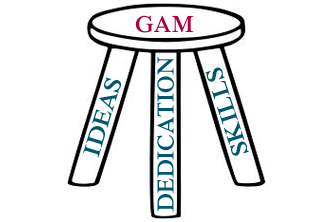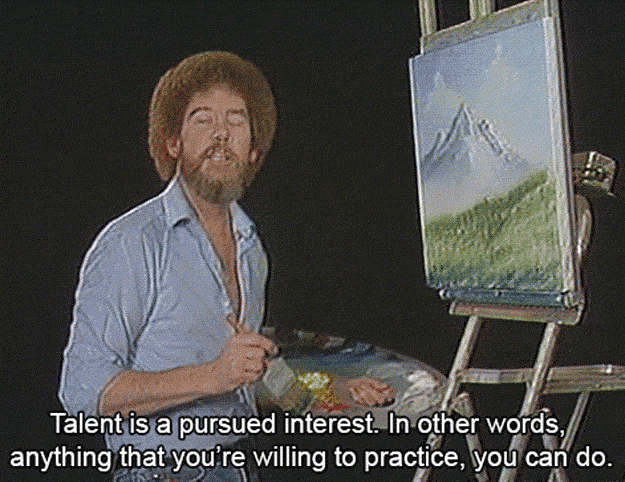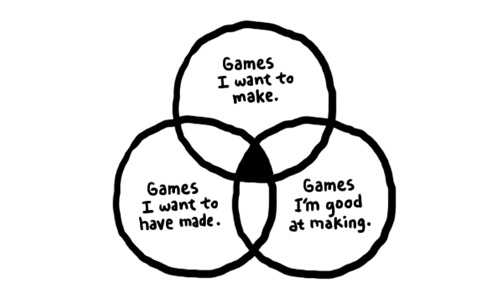SO YOU WANT TO BE A GAME DEVELOPER?
A guide to GAM MAK
 kentona
kentona- 04/16/2013 08:00 PM
- 30239 views
Gam Mak /gam/ /mak/ (n.)
1. The process of developing games with a hobbyist mindset, being mindful of the limited scope of both your skills and potential audience but aspiring to create a meaningful experience for both the potential players who play the game and yourself while you work on the game.
2. Purposeful mispelling of "Game Make", in a facetious nod to the serious business of game development.
See also: Game Make; Game Development

Not to be confused with Dim Mak (the Touch of Death)
From the life and times of kentona (incidentally, "Life of Times" would be a good name for an RPG) comes this article about the game development process from a hobbyist's point of view. Making games this way is not serious business, but it does take serious commitment. Let's talk a bit about that whilst I inspire you with brilliant quotes from people who have accomplished things of actual merit.
There are three facets of hobby game development that I wish to cover:
- Your Ideas
- Your Skills
- Your Dedication
You can think of these items as legs of a stool. Each of these pillars contribute to the attainment of your goals in the spirit of GAM MAK.

Your ass is the part that goes on GAM
Your ideas frame your game, and your game is your chosen tool of self-expression, so it is logical and obvious that your ideas are central to the development of your game. However, it is remarkably easy to lose focus during the course of your game's development.
Your skills will take your idea from some ephemeral concept to actual implementation. An idea without implementation isn't worth much - everyone is an "ideas" man (or woman)(or welp). Making them a reality is your job. This may sound daunting, but guess what? You have the skill to do it. Bob Ross believes in you.
Lastly, your dedication is the number one factor in determining whether your game is realized. In fact, if this were a one-legged stool, its leg would be clearly labeled "DEDICATION". During the development of your game there will be tedium - I guarantee it. Pushing through it is critical to the realization of your game.

Neglecting one of these pillars will lead to a different kind of stool
The true path to Gam Mak boils down to these three things:
- HAVE A CLEAR IDEA OF WHAT YOU ARE SETTING OUT TO MAKE.
- HONE YOUR SKILLS AND BE CONFIDENT IN THE SKILLS YOU HAVE.
- BE TENACIOUS IN YOUR EFFORTS.
1) Your Ideas
Executive Summary:
-Potential. Choose an idea with potential.
-Vision. Have a clear vision. Your game asks a question. Frame your game around answering it.
-Scope. Mitigate scope creep and the endless cycle of restarts.
This is the funnest part. This is the part that everyone loves. This is also the easiest part of the process, while at the same time, the easiest one to screw up, so pay attention!
Choose an idea with potential:
Chances are if you are reading this you have a game (or games) you want to make. There are also games you want made. And there are games that you are good at making - that is, game mechanics or genres that you gravitate to and that you know intimately (perhaps as a player, but also as a designer). Pursue what you love.
I have started several projects. Some I have finished, some I have left to languish, and others I've abandoned. But I've found that my most successful projects have been ones where I focused on making a game that I would enjoy playing. My advice is thusly: make a game that you'd think you would enjoy to play. Sounds obvious, doesn't it? It is. But it is easy to get sidetracked, or start catering to different preferences, or - and this is the biggest - your game you are working on grows boring.. I have news for you... This. Is. Inevitable. You will get bored of your own game. You goal, then, is to not lose sight of the original idea and its potential. It is still there, even though it is now buried under the grime of "the grind."
Have a clear vision:
What question is your game answering?
You might not realize it, but your game is answering a question.
Games are a form of self-expression (like any other artform), and as such give a venue for us to answer questions we might have. Seeing as how games are primarily about gameplay, it follows that your question will be about gameplay mechanics. Since we are hobbyists, and we are heavily influenced by the games we enjoyed, the questions we ask when making a game are often just blends of other games's ideas. And that's okay! Sometimes innovation and fun can come from the blending of the old!
For Hero's Realm, the question I asked was "What if extended the concept of the multiparty dungeons in Final Fantasy VI tothe entire game?". For Hellion, it was "What if I had some out-of-battle skills like in KOTOR but in a traditional RPG?" In both cases, I focused the game on answering those questions and supporting their experiences. (For Generica, it was a simple "What if I made a Dragon Quest fangame?").
What question is your game answering?
Determine that, and then focus your game's design on answering it. It has now become your guiding vision.
Limit the Scope:
Remember how I said you will get bored of your game? Do you know what the kneejerk reaction is when that happens? Adding more "systems", revisiting and revising old ones, bolting on more complexity - in a nutshell, letting the scope of the project grow so that your immediate boredom is alleviated. So you get to work on revamping your existing work, and adding in the new shiny pieces, getting them to mesh with what you had before... but then... it happens again. The new stuff isn't so exciting, the revamp is a little bland... but you've had a few new insights since then, and you are sure you can work them into your project to spruce it up! So you go back over your work, retooling and revising and adding. Lather. Rinse. Repeat.
And now you have a tangled unmanageable mess of a game.
Time to start a NEW project! (And this time it will be different!)

The elation you'll experience when you do the same thing and succeed
...right.
Scope creep refers to uncontrolled changes or continuous growth in a project's scope. This phenomenon can occur when the scope of a project is not properly defined, documented, or controlled. It is generally considered a negative occurrence, to be avoided.
You are in control. Don't let scope creep happen to you.
1. Save it for the next game. (You don't plan on stopping making games, right?)
Any new ideas you have, just document them in a separate file and shelf it for another day.
2. Cut out features. (Yes, chances are you are attempting too much already)
Decide what is really important to your game.
3. Make sure your core idea has potential. (What? This again?)
But really, your core idea or mechanic has to be fun from the getgo, otherwise you will be bolting on "systems" to cover up its inherent deficiencies.
4. Have a clear vision. (This article just repeats itself a lot.)
Know what you want to make, and slap yourself if you start deviating.
Someone once said: "Customers don't want you to be everything and anything to them. They want you to do one thing really well - reliably, predictably, and hassle-free." Gamers are largely the same way.
On a final note, I just want to touch upon innovation. Innovation is born from the interaction between constraint and vision. (Incidentally, "Constraint and Vision" would be a good name for an RPG).
"Constraints shape and focus problems and provide clear challenges to overcome. Creativity thrives best when constrained. But constraints must be balanced with a healthy disregard for the impossible. Too many curbs can lead to pessimism and despair. Disregarding the bounds of what we know or accept gives rise to ideas that are non-obvious, unconventional, or unexplored. The creativity realized in this balance between constraint and disregard for the impossible is fueled by passion and leads to revolutionary change."~Marissa Ann Mayer
You have a vision, and you will be purposely constraining yourself. So there you go. Be innovative.
2) Your Skills
Executive Summary:
-Practice. Talent is just a skill we take the time to hone.
-Feedback. Seek expert feedback, in intermittent doses. Release your work.
-Finishing. Finishing is a skill in of itself, and not something that just "happens".
Naturally, it will take a variety of skills to implement your ideas. Yes, you bring a certain skillset to the table, and you know your strengths and your weaknesses. But did you know that your weaknesses are just strengths you haven't developed yet?

See? I told you that Bob Ross believed in you.
"I can't sprite!" is not an acceptable position to take; the correct stance is "I can't sprite well... yet."
Ritualize practice:
Will and discipline are wildly overrated. No one has much of it (honest). So what can we do? Practice.
Practice intensely, without interruption for short periods of no longer than 90 minutes and then take a break. Ninety minutes appears to be the maximum amount of time that we can bring the highest level of focus to any given activity.
No one has a genetic predisposition for scripting or spriting or writing or mapping - it's not like it is encoded in our DNA.

"I have identified the gene responsible for the 3-tile rule."
If you want to get good at something, you have to do it. It's possible to build any given skill or capacity in the same systematic way we do a muscle: push past your comfort zone, and then rest. Aristotle had it exactly right 2000 some-odd years ago: "We are what we repeatedly do."
On that note, do you know what another "something" is? Game making. Stop making excuses and starting making your game.
"If you want to be really good at something, it's going to involve relentlessly pushing past your comfort zone, along with frustration, struggle, setbacks and failures. That's true as long as you want to continue to improve, or even maintain a high level of excellence. The reward is that being really good at something you've earned through your own hard work can be immensely satisfying."~Tony Schwartz
Release your work and seek feedback:
You can't make your game in a vacuum. Working on your game in your own little silo, hiding it in its own little bunker until final release is a mistake. Your game and its ideas are only ever exposed to your own limited perspective. Errors and bugs and typos will slip by you. You will grow numb to your own work.
Luckily, there is a wealth of resources out there for you to leverage! So grab that lever and rage! As a bonus, the attention garnered serves as a motivator to finishing your game.

But does anyone know of a good place to post your work-in-progress?
The simpler and more precise the feedback, the more equipped you are to make adjustments. (This is good!). Too much feedback, too continuously, however, can create cognitive overload, increase anxiety, and interfere with learning. (That's bad). Learn to balance feedback and criticism with your own perspective, and be prepared to reject aspects of either one. (This is good!)
Henry Ford once said: "If I'd listened to customers, I'd have given them a faster horse."
Fail fast forward (yay for business-speak!), that is, to implement something and then seeing what does and doesn't work, is a great concept for start-ups in the brainstorming and development phase, and for established projects that seek a new solution through innovation. For those situations it means, don't plan your ideas into non-existence/don't use planning and preparation as an excuse not to deliver - failure to launch is usually worse than failure to orbit the moon.
Finishing is a skill:
You should probably just read this.
Yeah, I did take the easy way out here, but hey! I wanted to finish this article. Also, remember one thing: don't work on a little of this or that all at once. Focus on one task and finish it to the minimal basic complete state before moving on. A scattered brain is an inefficient brain, and you have limits.
It takes several hours of daily practice to achieve excellence, so prioritize. Remember that big list of brainstormed ideas you had at the start? We're going to refine it!
After making a bullet point list of ideas, rate each bullet point on a few scales, like:
- Originality
- Viability
- Ease of development
- Resources required
- How fun it sounds to play
- How fun it sounds to implement
Discard bad ideas and sort remaining into Needs and Wants. Focus your efforts on your needs and only dabble in the wants. You can come back and add the bells and whistles after the core is ready. Dream big, but build iteratively.
"Writing your idea down is not starting the damn game. Writing a design document is not starting the damn game. Assembling a team is not starting the damn game. Even doing graphics or music is not starting the damn game. It's easy to confuse "preparing to start the damn game" with "starting the damn game". Just remember: a damn game can be played, and if you have not created something that can be played, it's not a damn game!"~Derek Yu
3) Your Dedication
Executive Summary:
-Motivation. Passion is an incredible motivator.
-Tenacity. Patience is also an important tool. This concept can get overlooked quickly in a rush to see results.
-Breaks. Take regular renewal breaks.
Motivation, passion and you:
"Make no little plans: they have no magic to stir men's blood."~Daniel Burnham, the Chicago architect whose vision recreated the city after the great fire of 1871

Pictured: large plans.
You have to be passionate about your game and your ideas. You have to be. It is the only thing we have to cling to when times get tough and our will and discipline ebbs (remember them? I warned you they were weak).
For those of you just starting out (or even to you oldhats out there), the following piece of advice seems radical: Make a big game first. This is contrary to the current mantra, and even intuition. "Work on smaller projects first and build yourself up to that big project you really want to make," they tell you. Bullhonky! When your passion for those little leading-up-to-the-real-thing projects wanes, and ultimately dies, your entire plan falls apart. And what have you got? Not the game you wanted to make, that's what.
Swing for the fences, man (or woman)!
Passion is an incredible motivator. It fuels focus, resilience, and perseverance. Staying passionate is important, and making something you really want to make is the best way to stay passionate. Other supplemental ideas are 1) to share your game with others, and their passion for the game can feed yours, 2) to use deadlines and events (and their corresponding rewards) to motivate you, and 3) be passionate about other people's project, and translate that enthusiasm into your own work.
"Make the game you want to see in this world"~Gandhi (paraphrased)
Tenacity in the city:
No matter how skilled you are or how awesome your ideas may be, if they aren't implemented they they aren't worth shit. This is why I say that dedication is the most important leg of the stool. You have to see your project through to the end for it to have any real lasting merit. And, fuck, is that hard to do. Tedium (or "The Grind") is inevitable. You have to push through that to make your game a reality.
Be tenacious. Push forward when you are feeling stuck. Chip away at the big daunting task ahead of you a little at a time. (Incidentally, "Big Daunting Task" would be a good name for an RPG).
"Only closers get Makerscore."~Alec Baldwin in Glengarry Glen RPG
We all move instinctively toward pleasure and away from pain. Do the hardest work first. Delay gratification and take on the difficult work first. Your motivation is highest at the start of your project, so taking on the hardest stuff first increases the potential of you successfully completing your game.
Renew thyself:
Relaxing after intense effort not only provides an opportunity to rejuvenate, but also to metabolize and embed learning. It's also during rest that the right hemisphere becomes more dominant, which can lead to creative breakthroughs.
Remember: Sleep, exercise, eat right.

Can you feel the cool water sap away your tension? I can.
In Summary
Remember the three-fold path to Gam Mak:
- HAVE A CLEAR IDEA OF WHAT YOU ARE SETTING OUT TO MAKE.
- HONE YOUR SKILLS AND BE CONFIDENT IN THE SKILLS YOU HAVE.
- BE TENACIOUS IN YOUR EFFORTS.
Now go forth young padawans and mak gam.
"You always believe in other people, but that's easy. Sooner or later, you gotta believe in yourself, too."~Gary in The Muppets
Posts 

6 out of 5 stars! Seriously, you covered some good stuff. Gamedev can be super stressful, but articles like this are always a good reminder of how to stay on track :)
I will probably keep telling people to start small with their projects, but then again, I sure as hell never started small... so screw it! Do whatever you want and just make games! If you fail I will like you more.
I will probably keep telling people to start small with their projects, but then again, I sure as hell never started small... so screw it! Do whatever you want and just make games! If you fail I will like you more.
A lengthy but rewarding read. Well worth it. I was happy to see most of the lessons I've learned over years of practice appear in this post, as well as some new insight. I was especially relieved to see that other developers face the same challenges.
As Derek Yu said, I have started to make alot of damn games, but have no damn games to show for it. I'm going to follow your advice Kentona and this time make my damn game.
As Derek Yu said, I have started to make alot of damn games, but have no damn games to show for it. I'm going to follow your advice Kentona and this time make my damn game.
I am glad that people have read this (and bonus that people enjoyed it!)
One caveat I should mention is that your first project will fail. When you first start you are bursting at the seams with all the cool ideas you're going to do and without any experience you'll make a garbled mess. It is a fact of Gam Mak.
author=AvariusHey, if you have additional insights, share them!
A lengthy but rewarding read. Well worth it. I was happy to see most of the lessons I've learned over years of practice appear in this post, as well as some new insight. I was especially relieved to see that other developers face the same challenges.
author=slashphoenixYeah, I was speaking from experience there. I have found that any of the "little" projects I've attempted have failed, but the big ones have been completed - even though they took years.
6 out of 5 stars! Seriously, you covered some good stuff. Gamedev can be super stressful, but articles like this are always a good reminder of how to stay on track :)
I will probably keep telling people to start small with their projects, but then again, I sure as hell never started small... so screw it! Do whatever you want and just make games! If you fail I will like you more.
One caveat I should mention is that your first project will fail. When you first start you are bursting at the seams with all the cool ideas you're going to do and without any experience you'll make a garbled mess. It is a fact of Gam Mak.
It was kind of ironic to read about scope creep, with my FF Forum RP continual alterations happening. :p
I this will definitely help budding game developers as they hone their craft and projects. Awesome combo of real life and experience and folksy wisdom.
***Teacher Achievement: YODA***
***Teacher Achievement: YODA***
author=kentona
One caveat I should mention is that your first project will fail. When you first start you are bursting at the seams with all the cool ideas you're going to do and without any experience you'll make a garbled mess. It is a fact of Gam Mak.
I love how true this is. I went into my first game knowing this already and figured, "What the hey, let's use it as the training wheels to help me make a proper one down the road." And I can definitely say that the experience of making one bad game only serves as a foundation for improvements afterward. That is, you can only go up.
Also: Make a game you would want to play is very good advice because really now. When you make a game you would like, you're catering to your own personal strengths through the design of it!
Jesus Christ. For the love of God someone sticky this article to the front page of the site. Forever.
author=kentona
One caveat I should mention is that your first project will fail. When you first start you are bursting at the seams with all the cool ideas you're going to do and without any experience you'll make a garbled mess. It is a fact of Gam Mak.
This is also utterly true. Hell, if your first project is playable that's pretty amazing.
author=Yellow Magicok
Jesus Christ. For the love of God someone sticky this article to the front page of the site. Forever.
I disagree about making your first game a big game.
A lot of people making their first game have never
used RPG Maker. I think having a direction is good:
have a story, have a couple things you want to achieve,
and find out what you need to learn to do it.
KISS (Keep is simple stupid, as the expression says.)
I think if you try to add too much to your game
(ie. in terms of resouces, scripts, or complicated ideas)
The program will get overwhelming. Your first project should
use the default engine so that you know how to use it.
And every project after that can get bigger and better.
Finishing your project is important and its easier to do if you
have something that isn't a 30 hour epic final fantasy clone (for example.)
For me my motivation game from the story and the characters I
was making. I didn't need to have the flashiest game out there.
If I thought my characters and story were interesting then I
was motivated to move forward. And sometimes when I thought
my story needed something extra I made one character really interesting.
My original plan for a character in Giadon Saga was not how
she turned out later. When I wanted to make her more interesting
the story became better as a result. Perhaps I'm just too
easily motivated...
(Honestly, I was tired of seeing the stats topic stickied.)
@kory_toombs: yeah, "big" wasn't the best word-choice there. "Ambitious" is the more appropriate term, and more in line with what I intended.
@kory_toombs: yeah, "big" wasn't the best word-choice there. "Ambitious" is the more appropriate term, and more in line with what I intended.
author=Yellow Magic
Jesus Christ. For the love of God someone sticky this article to the front page of the site. Forever.
They should add this to the New To RMN Article.
Worth reading :)
This is indeed good, but I've also found collaboration useful here. Remember, some people may excel in certain areas you yourself lack. In fact, I've found collaborating is quite successful.



























